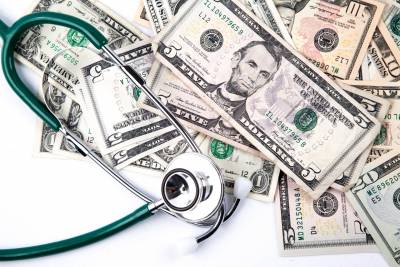
The national nonprofit is raising money to relieve medical debt for the courageous first responders on the frontlines of the pandemic
RIP Medical Debt announced this week that it has created the Helping COVID Heroes Fund to relieve the financial burden of medical debt on American healthcare workers and emergency responders including nurses, home health aids, pharmacists, social workers, hospital technicians, the National Guard and others on the frontlines of the fight against coronavirus.
RIP Medical Debt is a national nonprofit that raises money to abolish unpayable medical debt for Americans most in need, and has abolished more than $1 billion of it since its founding in 2014.
Although frontline “helping heroes” work in healthcare and aim to save the lives of people infected with COVID-19, they are not immune from unpayable medical debt, the organization said in a news release. “Just like other Americans, they suffer from debt due to co-pays, high deductibles and coinsurance.”
Donations to the Helping COVID Heroes Fund will be used to identify, buy and abolish the pre-existing medical debts of healthcare professionals and other Americans working across our country’s emergency response infrastructure to support their heroic efforts in this time of crisis. This is critically important as frontline workers are more likely than others to get infected with COVID-19 and cost of care should not be an impediment to getting proper treatment.
To read more about the fund and to donate: https://ripmedicaldebt.org/campaigns/#covid
To raise awareness about the fund on social media, please use the hashtags #HelpingHeroesFund & #COVID19
FAIR Health estimates that the uninsured could pay between $42,000 – $74,000 if hospitalized with coronavirus. While the White House recently announced that uninsured patients will be treated for free and that the government will reimburse hospitals at Medicare rates, tens of thousands of insured Americans are at risk of massive surprise, out-of-network bills related to coronavirus treatment, and often face high deductibles. The Kaiser Family Foundation estimates that with insurance COVID-19 treatment in-hospital could cost as much as $20,000. RIP’s work is essential for relieving stress on an already fragile economy.
“In normal times, Americans suffocate under the mental and financial burdens of medical debts,” shares RIP’s Executive Director, Allison Sesso. “This health and economic crisis makes RIP’s work to eliminate these debts more essential than ever. By focusing our relief efforts on the debts owed by our brave first responders, we’re letting them know that the community has their back.”
RIP has already identified more than $70 million in unpaid, unpayable medical debt belonging to those in healthcare/first responder roles as identified by union membership or professional license — and the nonprofit is actively looking for more qualifying accounts. After those debts are paid, RIP will use raised funds to relieve debts belonging to those in the service and hospitality industries, who have been disproportionately affected by the pandemic. Finally, the fund’s third tier of relief will go towards financially struggling families in those areas hit hardest by the coronavirus.
“By buying medical debt in highly discounted, bundled portfolios RIP can relieve medical debt for much less than its face value; donations to RIP go the extra mile during this unprecedented economic crisis,” the company said.
With shelter in place mandates across the country, the economy is shedding jobs with more than 10 million Americans applying for unemployment in the last two weeks of March alone, with some economists worrying conditions could approach the 25% unemployment peak of the Great Depression.
Medical debt not only lowers one’s credit score and can lead to wage garnishment or bankruptcy, it is an undeniable barrier to receiving adequate healthcare:
- One third of working Americans have medical debt and over half of them have defaulted on a debt(s)
- In 2017 44% of Americans didn’t see a doctor when they were sick or injured because of the high cost
- One in three households in America is “financially fragile” and can’t withstand a midsize budget shock like a medical bill


Chattooga Opinions
The Joy of the Journey: More Than a Conqueror

Bulloch Public Safety
02/06/2026 Booking Report for Bulloch County

Bulloch Public Safety
02/05/2026 Booking Report for Bulloch County

Chattooga Local News
Carr Takes New Action to Prosecute Fulton County Domestic Terrorism Case

Chattooga Local News
Summerville Man Arrested After Shooting Neighbor’s Dog Over Chickens

Bulloch Public Safety
01/20/2026 Booking Report for Bulloch County

Bulloch Public Safety
01/12/2026 Booking Report for Bulloch County

Bulloch Public Safety
01/26/2026 Booking Report for Bulloch County

Bulloch Public Safety
01/22/2026 Booking Report for Bulloch County

Bulloch Public Safety
01/16/2026 Booking Report for Bulloch County




